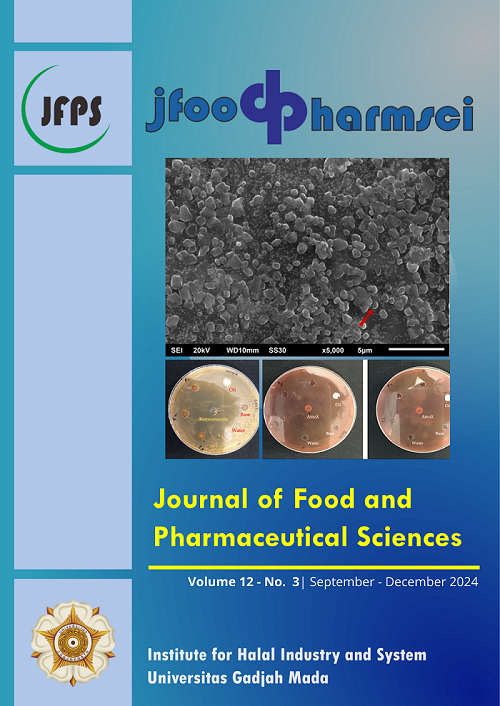The Evaluation of Clove oil Concentration on Physicochemical and Antimicrobial Activity in the Laponite Gel Delivery System
Abstract
Recurrent Aphthous Stomatitis (SAR) is inflammation in the oral mucosa. One of the factors that can cause SAR is bacterial and fungal infections of the oral mucosa. Clove oil is an essential oil that contains eugenol and has antimicrobial, analgesic, anti-inflammatory, and antioxidant activities. Clove oil in this study resulted from steam distillation with an eugenol content of 71.06%. Clove oil as an antimicrobial topical requires a drug delivery system that is easy and comfortable to apply. Laponite is a synthetic hydrophilic layered silicate that can hydrate and expand when water is added, is compatible with the properties of active ingredients, and is without an emulsifier. Please state the objective of this research. This research aims to determine the effect of variations in the concentration of clove oil incorporated in laponite on the gel's physicochemical properties and antimicrobial activity. Laponite with a concentration of 2.5% was developed in water and then added to clove oil with a concentration of 2%, 4% and 6%. Physicochemical properties test of oral gel preparations includes organoleptic tests, homogeneity, pH, adhesion, and spreadability tests. Antimicrobial activity test to Streptococcus mutans bacteria and Candida albicans fungi. The research showed that a gel preparation using laponite with a concentration of 2.5% was semi-solid with a clove oil odor. Clove oil, with an eugenol content of 71.06%, has potent antimicrobial activity. The higher concentration of clove oil increases the viscosity and sticky time but decreases the pH and spreadability. The adhesive time and pH of the gel are suitable for application to the oral mucosa with mouth ulcers, and 2.5% laponite can form a gel preparation that meets the gel's physicochemical properties and antimicrobial activity.














